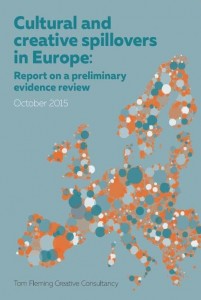 A European report has just been released which reviews the available evidence and methodologies for cultural and creative 'spillovers' into other areas of society. The researchers, who included the creative industry veteran Tom Fleming, looked for evidence in:
A European report has just been released which reviews the available evidence and methodologies for cultural and creative 'spillovers' into other areas of society. The researchers, who included the creative industry veteran Tom Fleming, looked for evidence in:
- knowledge spillover (new ideas, innovations etc from the arts and cultural sector which might spillover into the wider economy)
- industry spillover (e.g. productivity and innovation from having dynamic cultural presence)
- network spillover (e.g. impacts on society and economy from the presence of cultural clusters)
This might not surprise you, but Fleming and his team found that there is not enough evidence in all the many research articles out there to demonstrate a causal link between the arts/culture and many claimed spillovers. The research for these areas were persuasive, but fell short of proving causality.
He did find that there were several areas where causality had been established to a scientific standard:
- communications can be boosted within organisations
- culture-led regeneration has a positive impact
- cross-fertilisation occurs between commercial and no=commercial sectors
- investment in design has an impact
- spillovers play a role in boosting uptake of new technology
- networks are important in spreading innovation
We were excited to see Fleming recommend the following to really look at if and how arts/culture can cause social change:
- experimental studies which include control groups
- action research, testing hypotheses through interventions over time
- proxy research approaches
We have our fingers crossed extremely tightly that some funding goes towards this in the academic and cultural space. As we all know, the kind of research to find out if the arts 'changes the world' and if so, exactly how and where and when and who, costs the kind of money most arts organisations don't have.
At the moment what we mostly do in our evaluations is look at the existing research into the determinants of particular social outcomes e.g. wellbeing, inclusion, and see if we can hypothesise a sound theoretical chain of contribution to these determinants by the arts activity. Or not.
This is a perfectly acceptable way of evaluating arts projects (and is used in other areas with similar complexity around causation, such as health promotion). But you do need the big research on which to rely upon when looking for whether your arts project is contributing to the determinants of wellbeing, inclusion, increased productivity, or whatever it might happen to be. So let's hope academics and institutions can support Fleming's recommendations and put the question to rest (or perhaps, to work) - how do the arts really change the world?
